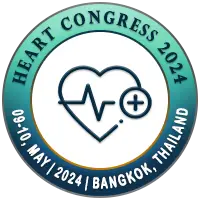
Alexandros Tselepis
University of Ioannina, GreeceTitle: Cardiotoxic effects of antitumor agents: Pathogenetic mechanisms
Abstract
Cardiotoxicity is perhaps the most serious nonhaematological side effect of the anticancer drugs.The antitumor drugs that express cardiotoxic effects include anthracyclines, tyrosine kinase inhibitors, taxanes, fluoropyrimidines, alkylating agents, etc. The spectrum of cardiotoxic effects of anticancer drugs is broad and include, among others, heart failure, arrhythmias, hypertension, cardiomyopathy, myocarditis, valve disease, pericardial disease, vascular events and myocardial ischemia. The molecular mechanisms by which anti-cancer therapies lead to cardiotoxicity are diverse and vary according to the specific type of agent used. They include oxidative stress, topoisomerase 2-β inhibition in cardiomyocytes, inflammation, endothelial dysfunction, apoptosis, disruption of Ca2+ homeostasis, DNA damage, etc. The management of cardiovascular complications in cancer patients is a new challenge for oncologists and cardiologists. Thus the cardio-oncology field has developed the last decade in order to precisely predict and efficiently treat the cancer treatmentrelated cardiovascular diseases.
Biography
Alexandros Tselepis has graduated in Pharmacy (University of Thessaloniki) and in Medicine (University of Ioannina, Greece). He obtained his PhD in Clinical Biochemistry at the University of Ioannina. His research work continued with a postdoctoral fellowship (Fogarty, NIH) in the Pathology Department, University of Texas Health Science Centre, at San Antonio, USA (1988-89). From 1994 to 1999 he took a sabbatical leave and conducted research work on lipoproteins and atherosclerosis as an invited researcher in INSERM U321 Paris, France. Currently he is the Professor of Clinical Biochemistry, Director of the Atherothrombosis Research Centre (http://atherothrombosis.lab.uoi.gr) and President of the interdepartmental Postgraduate Programme “Medical Chemistry” of the University of Ioannina (http://medchem.ac.uoi.gr). His main research interests concern the pathophysiology of Atherothrombosis. He has supervised 25 PhDs, 35 MSc and 10 postdocs and he has an over than 25 years’ experience in managing international and national research projects. Currently he has 272 publications in peer reviewed journals and more than 10,000 citations, whereas his h-index is 47, according to scopus.

